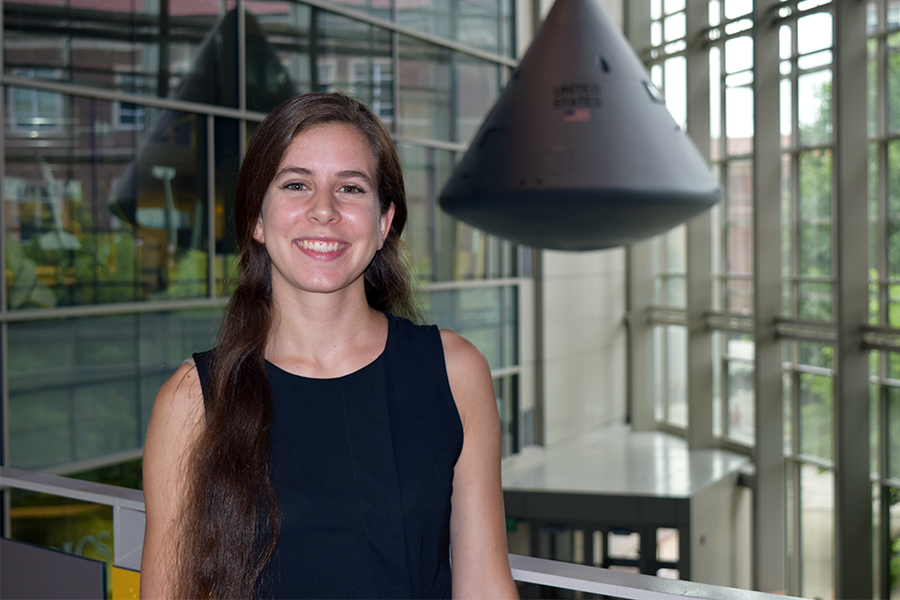Young Professionals Advisory Council: Pau Pineda Bosque

Seemingly every other week, Pau Pineda Bosque is celebrating some kind of milestone.
Working for an emergent company like Virgin Orbit, a sister company of Virgin Galactic, perhaps that’s not surprising.
Especially considering Virgin Orbit is getting closer and closer to launching a rocket into space from the wing of a Boeing 747, effectively changing the small satellite market with a launch service that provides customers flexibility in scheduling and sending payloads into low-Earth orbit.
As a propulsion test engineer who has been acting as the test stand lead for that rocket’s second-stage engine, no wonder Pineda Bosque’s job has been “super exciting.”
That’d include watching a pivotal drop test July in California. Then Cosmic Girl, the modified Boeing 747, dropped a fully-built rocket full of water and antifreeze — to simulate the weight of propellants the real LauncherOne will carry. The test was a success, and the team collected data that has been crucial to continue the development of the rocket.
“Of course, not everything is shared outside the company, but you can see progress all the time,” said Pineda Bosque, who received her bachelor’s from the School of Aeronautics and Astronautics in 2018. “There’s anticipation building. We’re definitely working a lot of hours to get the program moving. But we’re pretty excited for what’s to come.”
The next step is to finalize testing of the first orbital test rocket, the company said. It’s currently undergoing a series of checks and rehearsals by the operations team leading to its first launch to space later this year.
Pineda Bosque will continue to be in the midst of that operations work, but she took a break at the end of August to visit Purdue as part of AAE’s Young Professionals Advisory Council. Pineda Bosque’s interest in YPAC initially was piqued while she was a student, and when she heard one of her friends and Virgin family counterparts wasn’t going to be able to attend this year, she quickly contacted Professor Steven Collicott. Collicott, who assembles the group, was familiar with Pineda Bosque: She’d been team lead for one of his Micro-g Neutral Buoyancy Experiment Design Teams (NExT).
“It was really fun,” Pineda Bosque said of the visit, which included meeting with faculty, students and academic advisors, among others. “One thing I noticed right off the bat was that I got to talk to all these incredible people who were my professors and now they’re talking to me not as a student but as a professional. For the first time, I feel like there’s something I can give them instead of them teaching me everything. I just thought it was cool to be on a different level talking to them and feeling like I could give back.”
Pineda Bosque was happy to speak with undergraduate academic advisors, too, and offer feedback on which classes equipped her with skills she uses now.
Those are wide-reaching, considering Pineda Bosque credits AAE with “teaching you how to learn.” She said her design concentration was helpful, allowing her to see how different parts of the test stands and the engine interact, knowledge that goes beyond hardware. That’s been helpful in her current role in operations, too, coordinating between priorities, breaking down what all the requests mean and then being able to organize all that and have a functional system to test the engines.
Interestingly, perhaps one of the best equipping opportunities in AAE, the hands-on experience available at Maurice J. Zucrow Laboratories, is one Pineda Bosque didn’t take advantage of. When she came to Purdue, she figured she’d focus on propulsion, but she ultimately didn’t. So when she arrived at Virgin, she admittedly didn’t know much about rocket engines. But instead of being timid or sitting back, Pineda Bosque showed a learner’s mindset and asked questions. Often. She learned to get comfortable saying she didn’t understand and asking for specifics. That helped her pick up the job quickly.
So much so she said she’s the youngest test conductor and test director Virgin Orbit has had.
“I had to figure it all out, mostly from scratch,” she said. “I just went through and spoke to the different engineers who were responsible for the designs of all the different parts of the test stands and different parts of the engine. It was just attitude and focus.”
Mostly, Pineda Bosque has been focused on operations for the past year, learning the right way to work the stand, figuring out how to bring dangerous commodities safely in a space with people, having a hot test fire and making sure it’s safe while also meeting the requirements of the test. When she’s not in operations, she’s working in ground support equipment that includes the test stand and maintenance.
She’d been the test stand lead for LauncherOne’s upper-stage engine, Newton-Four, until passing off that duty recently. In that role, she was responsible for providing the engine with anything it needed. That included making sure the valves and instrumentation were working, verifying the pressure and temperature of the engine’s commodities, while also always looking at ways it can be improved.
“Where can we benefit from having more data? How can I put an instrument in to record that? Or how we make this part of the process a little bit faster? How can we make this temperature a little bit colder? There’s a lot to do all the time,” she said with a laugh. “It’s pretty exciting.”
